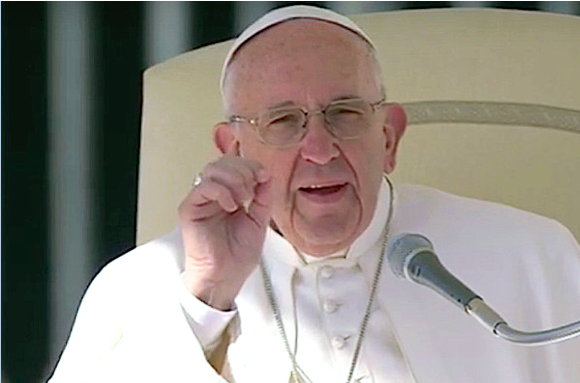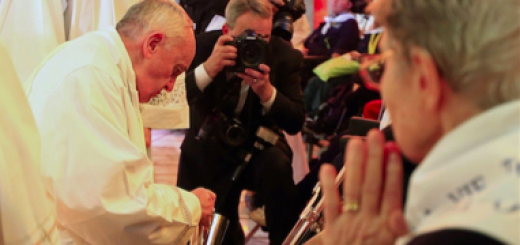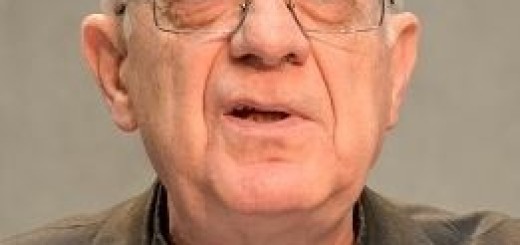Give, Forgive, Never Judge or Condemn

Pope Francis Gives 2 Verbs of Mercy at General Audience – Published in Zenit, the world seen from Rome, Sept. 21/16
Reflecting on Merciful Love, Francis Says Christians Are Called to Give and Forgive, and Never to Judge and Condemn
(Note: “Give and Forgive, and Never Judge and Condemn,” are the two words as “dos and don’ts” Pope Francis gives to his listeners. Is this advice to be practiced by rational human beings in this world? There would be no takers among rational humans in this world, as far as this puny mind is concerned, and that with all respect to Francis who is welcome to live in a dream land. One can understand the saying: “Love the sinner, hate the sin’, but not this!Why then are the ten commandments of God and all the dos and don’ts of the Church, if the rule is to forgive always and never to judge? Why then are all the teachings of the church about the last judgment, heaven, hell and purgatory? How are governments and courts to function then? You can dream of galloping horses in the sky, but you can’r ride them. That is why none of the retreat preachers are not taken seriously. That is why there are ever so many good atheists, which again, Francis is first to admit. The gospels and the bible are full of such contradictory statements, which people simply ignore, for the sake of not offending incorrigible blind believers in their holy books, Gurus, and God-men and women. Here the Pope was reflecting on Lk. 6: 36-38.
If God is the one who created the kind of humans we have on earth, leave it to Him to manage them after their death. It is here on earth that He is failing miserably to make them think sense, speak sense and do sensible, reasonable things. That is what has driven me to the conclusion about the riddle of life and write: “The only thing I know for certain about it all is that I do not know. That applies to things in this world and in the ln the next..” Here below we create our own heaven and hell. As for the next world I can tell you anything only after going there and touching and seeing them, as a doubting Thomas once said.
Of course what the Pope says will help a lot to reduce frictions, misunderstandings, fights, international terrorisms by the rich and powerful, peoples or nations. For the moment what rules roost every where is “Might is right ” That might may be one’s physical might, money power, military power, or man power (vote bank politics).  Hence the stress all put on the need to cultivate a democratic sense to live and let live through dialogue and discussion without resorting to violence. In any case all know that war and violence are not good for the health – physical,spiritual, intellectual, cultural, social – of any one of us humans. james kottoor, editor)
Hence the stress all put on the need to cultivate a democratic sense to live and let live through dialogue and discussion without resorting to violence. In any case all know that war and violence are not good for the health – physical,spiritual, intellectual, cultural, social – of any one of us humans. james kottoor, editor)
Pope Francis has given faithful the two verbs of mercy, stressing that for fulfillment in life, we are called to forgive and give.
During this morning’s General Audience in St. Peter’s Square, while reflecting on Luke’s Gospel (6: 36-38) on mercy which inspired the Jubilee Year’s motto: ‘Be merciful as your father is merciful,’ Francis stressed this is “not a slogan for effect, but a life commitment.”
Francis recalled that in the Sermon on the Mount, which opens with the Beatitudes, the Lord teaches that perfection consists in love, and reminded those present that St. Luke explicitly explains that perfection is the merciful love: ‘to be perfect means to be merciful.’
“A person who is not merciful is perfect?” the Pope asked. “No!”“A person who is not merciful is good? No!” he continued, clarifying that goodness and perfection are always rooted in mercy.
Realistic for Us?
“Of course, God is perfect.” the Pope said, noting that even if we humans are not capable of reaching absolute perfection, our being merciful is all that God expects from us. “He urges us to be as He is, full of love, compassion, mercy.”
“But I wonder: Are the words of Jesus realistic? Is it really possible to love as God loves and be merciful like Him?” The Jesuit Pope noted that if we look at the history of salvation, we see that the whole revelation of God is a ceaseless and untiring love for mankind, and that Jesus’ death on the Cross is the culmination of the love story between God and man.
Francis admitted that only God can accomplish a love so great, and that, “It is clear that, compared to this love that has no measure, our love will always be at fault.” “But when Jesus calls us to be merciful as the Father,” Francis continued, “He does not think the amount! He asks his disciples to become sign, channels, witnesses of his mercy.”
Jesus, the Pope explained, wishes that His Church is a sacrament of God’s mercy in the world, at any time and for all mankind. “Every Christian, therefore, is called to be a witness of mercy, and this happens in the path of holiness,” Francis said, urging: “Think of how many saints have become merciful, for they are left to fill the heart of the divine mercy.”
2 Verbs of Mercy
The Pope then said that we do ought to ask ourselves: ‘What it means for the disciples to be merciful?’ He responded that Jesus has already given us the answer, that lies in living out two verbs: forgiving and giving.
Mercy is expressed, first of all, in the forgiveness: “Stop judging and you will not be judged. Stop condemning and you will not be condemned. Forgive and you will be forgiven.”(v. 37)
“Jesus does not intend to pervert the course of human justice, however, He reminded His disciples that to have fraternal relations, one must suspend judgments and sentences. Forgiveness,” he noted, “is the pillar that holds up the life of the Christian community, because it shows the gratuitousness with which God has loved us first.”
“The Christian must forgive! But why? Why he was forgiven. All of us who are here today, in the square, we have been forgiven. None of us, in life, had no need of God’s forgiveness. And because we have been forgiven, we must forgive.”
Judging and condemning the brother who sins, the Pope said, is wrong. “Not because I do not want to recognize sin, but because in condemning the sinner, the bond of fraternity with him breaks.’
“We have the power to condemn our erring brother, [but] we are not above him: we have rather a duty to recover the dignity of a child of the Father and accompany him on his journey of conversion.”
‘The Measure’
The Pope then discussed how Jesus has given us a second pillar: ‘giving.’ Francis reminded them of Jesus’ advice: “For the measure with which you measure will in return be measured out to you. (v. 38)” Noting how God gives far beyond our merits, Francis noted that He will be even more generous to those on earth who were generous to others.
“Jesus does not say what will happen to those who do not donate, but the image of the “measure” is a warning: with the measure that we take, we can determine how we will be judged…’ Merciful love, Pope Francis underscored, is the only way forward.
“We must forgive, be merciful, live our life in love. This love enables Jesus’ disciples not to lose the identity received from Him, and to recognize themselves as sons of the same Father. But do not forget this: mercy and blessing; forgiveness and gift. In this way, the heart enlarges, it widens in love. Instead selfishness, anger, make the little heart, which hardens like a stone.”
“What do you prefer?” Pope Francis concluded asking. “A heart of stone and a heart full of love? If you prefer a heart full of love, be merciful!”
‘Remember’ Those With Alzheimers
Following his catechesis and his greetings in various languages, the Holy Father recalled the XXII World Alzheimer Day, which takes place today, on the theme “Remember me,” and urged all faithful gathered in St. Peter’s Square to remember those who are affected by the disease and their families.
Pope Francis prayed to the Blessed Virgin Mary and Jesus, for their care and tenderness, in making those with Alzheimers feel the closeness of all those praying for them.
















